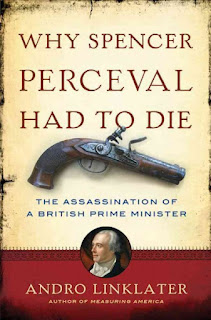.jpeg) It has been 200 years since an event of which I had never heard - an event that author Andro Linklater claims changed the course of history. On May 11, 1812, British Prime Minister Spencer Perceval was shot and killed upon entering the lobby of Parliament on his way to a hearing in the House of Commons. With many witnesses, there was no doubt that John Bellingham, a businessman from Liverpool, was the assassin. Linklater recounts how paths of the prime minister and businessman crossed in Why Spencer Perceval Had to Die: The Assassination of a British Prime Minister.
It has been 200 years since an event of which I had never heard - an event that author Andro Linklater claims changed the course of history. On May 11, 1812, British Prime Minister Spencer Perceval was shot and killed upon entering the lobby of Parliament on his way to a hearing in the House of Commons. With many witnesses, there was no doubt that John Bellingham, a businessman from Liverpool, was the assassin. Linklater recounts how paths of the prime minister and businessman crossed in Why Spencer Perceval Had to Die: The Assassination of a British Prime Minister.The author thinks that it is curious that such a dramatic and important incident has been mostly forgotten. It seems that British authorities wanted it that way. Bellingham was tried and hung within a week of the crime. Little effort was made to investigate why the businessman wanted to kill the prime minister, and the story was soon out of the newspapers. Many people were actually pleased to have the very powerful Perceval dead, Linklater claims. The people of London poured into the streets to celebrate upon hearing the news of the assassination.
In a way, Linklater's research was cold case investigation. Readers learn from his book much about the people who benefited from the crime and its impact on the ongoing war with France, the new war with the former American colonies, and the British Navy's efforts to enforce the Abolition Act of 1807 which aimed to stop the international slave trade. British bankers and shipowners of Liverpool had a lot of money invested in the slave trade. Fans of both American and British history will enjoy Why Spencer Perceval Had to Die.
Linklater, Andro. Why Spencer Perceval Had to Die: The Assassination of a British Prime Minister. Walker & Company, 2012. 296p. ISBN 9780802779984.



No comments:
Post a Comment